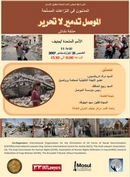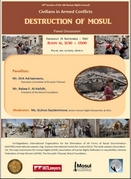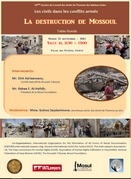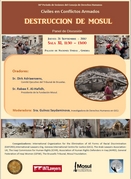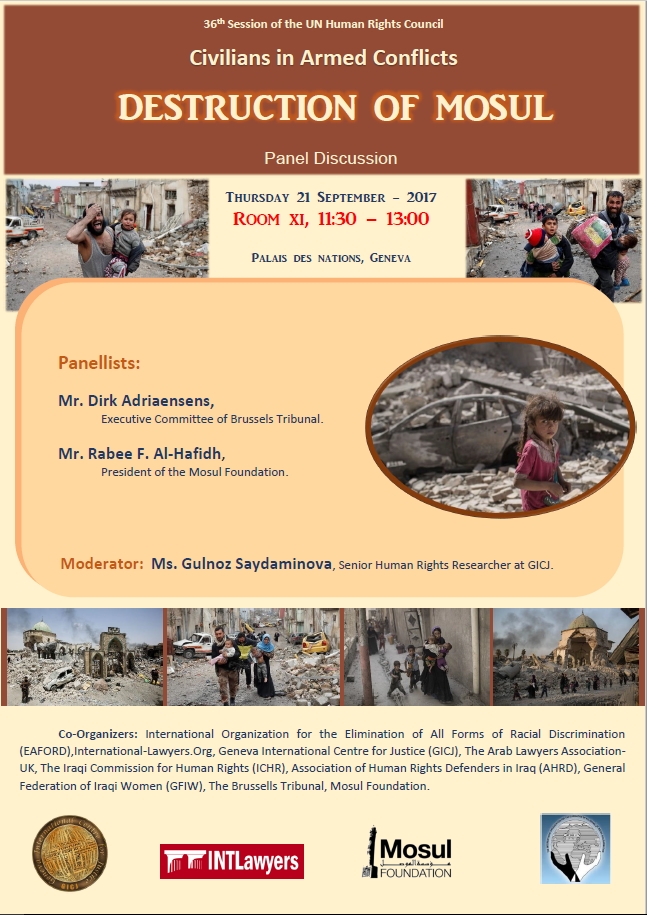
On July 10, 2017, Iraq’s Prime Minister Haider al-Abadi officially announced the liberation of Mosul and the victory against the Islamic State (ISIS) – which had taken control over Iraq’s second largest city in 2014. However, he failed to acknowledge the dramatic impact of the “liberation campaign” on Mosul’s citizens, infrastructures and historical sites. In fact, Mosul – cradle of civilization and world-renowned artistic and cultural hub – and its 2-million inhabitants suffered tremendous losses, and were ravaged by the fury of the Islamic State’s fighters and by the indiscriminate attacks of Iraqi and American forces.
Since the beginning of the military operation in late-2016, thousands of civilians were forcibly displaced, many more were killed, wounded and maimed by violent attacks and airstrikes, hundreds were used as human shields, and countless men, women and children were tortured, threatened and arbitrary killed by both governmental forces and ISIS fighters. Furthermore, following months of siege and terror, civilians were forced to leave all their belongings behind to seek refuge in makeshift shelters and camps – poorly set up by the Iraqi government, which failed to provide basic services and to ensure the safe return of displaced persons.
In light of the grief losses among civilians in Mosul and the almost total destruction of several parts of the city, as well as, of the dramatic loss of artistic and cultural heritage in the city, this side event aims at shedding light on the responsibility of the international community and at identifying viable strategies for the reconstruction of the city, ensuring justice and accountability for its citizens. The international community has, also, the legal and moral duty to intervene and to lead concerted efforts to ensure reconstruction and reparation.
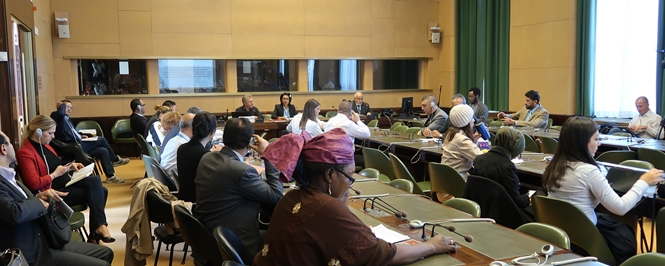
Introduction by Ms. Saydaminova
The humanitarian crisis in Iraq is one of the largest and most volatile crises in the world today. Violence between armed groups and the Government, especially ever since the so-called “Battle for Mosul” in October 2016, has resulted in over 3 million people being displaced. Over 11 million people are in need of humanitarian assistance, and more than 30,000 civilians are dead in the city of Mosul alone. War crimes, crimes against humanity and genocide, as well as many other human rights violations, have not been investigated during the years, and perpetrators have enjoyed impunity.
The US-led international Coalition, ISIS, as well as other groups, are still committing gross violations of human rights, and they are not being held accountable for them, despite evidence that has surfaced demonstrating these violations. Victims and civilians are unable to obtain reparation, and up until now the Iraqi Government has not been able to provide adequate protection for them. This event aims to shed light on what is going on in Mosul, and what the international community is doing to fulfil its responsibility to protect civilians. Moreover, this event will take into consideration what can be done for the reconstruction of the city of Mosul, and to ensure accountability.
Moderator:
Ms. Gulnoz Saydaminova – Ms. Saydaminova is the Senior Human Rights Researcher at the Geneva International Center for Justice, previously served in the Office of the UN High Commissioner for Human Rights on legal protection of civilians within Humanitarian Response Team, contributed to human rights protection of ethnic minorities in the post-conflict Balkans during seconded assignments in the Missions of the Organisation for Security and Cooperation in Europe (OSCE).
Speakers:
Mr. Dirk Adriaensens – Mr. Adriaensens is on the Executive Committee of Brussels Tribunal. He is also the coordinator of SOS Iraq, an organisation that campaigned against the sanctions imposed on Iraq (1990-2003). He is also a member of the executive committee of the Brussels Tribunal, a renowned international network of intellectuals, artists and activists. He is co-author of Rendez-Vous in Bagdad, EPO (1994), Cultural Cleansing in Iraq, Pluto Press, London (2010) and Beyond Educide, Academia Press, Ghent (2012).
Dr. Rabee al-Hafidh – Dr. al-Hafidh is the President of the Mosul Foundation. He has specialized in how the modern nation State has evolved and formed in the Arab region during the post war period. Moreover, his work also concentrated on analysing how religious extremism in this region has had an impact on the dissolving of historic religious institutes, and on what role minorities have played in this scenario.
Panel Presentations
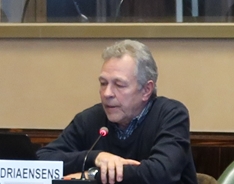 Mr. Adriaensens was the first speaker to open the discussion, by stating that the destruction of Sunni cities in Iraq is a very important issue to address. The scale of destruction deriving from the battle of Mosul, which lasted for 267 days, was immense. This battle was announced on the 10th of July, 2017, as a “liberation”; however, for many civilians living inside the city, the results of the US-led International Coalition Campaign, together with the Iraqi Government, were not considered as a liberation, and they were not celebrating. The general discontent was also due to the destruction of great parts of the city’s infrastructure. Hospitals, medical centres, educational institutions, as well as 11,000 housing units, four electrical power plants and six water purifying systems, were completely devastated, along with oil refineries, public buildings, 63 religious centres and many factories. The Western side of Mosul suffered the most from the destruction; almost 99% of West Mosul was decimated. The humanitarian situation in the rest of Iraq is also disastrous; millions of people are in need of urgent humanitarian aid, over a million civilians have been displaced and over 1 million children are not in school.
Mr. Adriaensens was the first speaker to open the discussion, by stating that the destruction of Sunni cities in Iraq is a very important issue to address. The scale of destruction deriving from the battle of Mosul, which lasted for 267 days, was immense. This battle was announced on the 10th of July, 2017, as a “liberation”; however, for many civilians living inside the city, the results of the US-led International Coalition Campaign, together with the Iraqi Government, were not considered as a liberation, and they were not celebrating. The general discontent was also due to the destruction of great parts of the city’s infrastructure. Hospitals, medical centres, educational institutions, as well as 11,000 housing units, four electrical power plants and six water purifying systems, were completely devastated, along with oil refineries, public buildings, 63 religious centres and many factories. The Western side of Mosul suffered the most from the destruction; almost 99% of West Mosul was decimated. The humanitarian situation in the rest of Iraq is also disastrous; millions of people are in need of urgent humanitarian aid, over a million civilians have been displaced and over 1 million children are not in school.
Mr. Adriaensens went on to say that the civilian casualties and the massive bombing of the city are not the only crimes committed by the US; he mentioned that the use of white phosphorous by the US-led Coalition constitutes a serious war crime, since it is an internationally forbidden weapon in populated areas. Moreover, the catastrophic number of affected people is not getting the necessary attention within the international community, especially by politicians and journalists. It must be kept in mind that the accurate number of victims is still unknown, and we have to mainly rely on estimates encompassed in press reports concerning the victims in Mosul. More than 4,000 bodies are still under the rubble in West Mosul; even though more equipment and resources have been requested to deal with the crisis, there has been no response.
According to Mr. Adriaensens, the difference between Mosul and other cities is that in the latter, civilians either fled or were evacuated before the fighting; on the other hand, in Mosul, many civilians decided to remain in their homes, due to several different reasons. Some of them did not want to leave their homes and families, but it appears that the majority of civilians in Mosul stayed because the Government asked them to, assuring them security via the distribution of leaflets. This occurred not only because the Iraqi Government feared that the flow of refugees would be unmanageable, but also because the Generals of the Iraqi army thought this would help them gain information on ISIS from the citizens. They also assumed that they would be praised for their salvation efforts. Nonetheless, people of the city were excluded from the celebrations during the victory parade which took place in Baghdad; however, it is evident that there would have been little to celebrate, due to the losses they had suffered. While the number of civilian victims is always downplayed by the media, the number of ISIS militants killed is at the centre of reports by the media and by the Government.
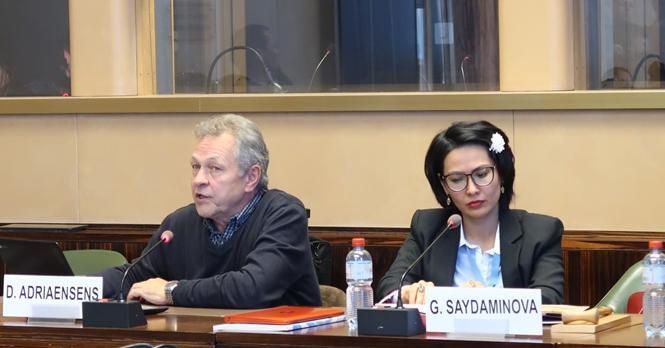
Mr. Adriaensens then went on to speak about the current situation in the city, and about the challenges that civilians are facing. According to the IOM, in July 2017 it resulted that 825,000 civilians in Mosul were still displaced, and housed in either tents or camps. For most of these refugees, the possibility to return is impossible, since most of them don’t even have a home to return to anymore. At the moment, the city of Mosul does not have access to water or electricity, food is scarce and hospitals and schools have been destroyed.
There have been attempts to encourage people to go back to their homes, and seminars have been put in place for this purpose. However, it appears that civilians don’t feel the need to return until the city’s services are restored, and the economy is re-launched. Even if they wanted to go back, it has been noted that the Migration department has no program for displaced persons who return; displaced persons are not given their due redress, and are sceptical of what they will receive from Government forces in terms of compensation. Moreover, security has become a major issue for those who have returned or who plan on returning, since booby traps and bombs that have not yet exploded were left behind during the Campaign. Experts have stated that it may take up to a decade to clear the area and ensure security.
Another point stressed out by Mr. Adriaensens, is the high level of corruption amongst the Iraqi soldiers occupying Mosul. Suspected ISIS members can pass through military checkpoints by bribing the soldiers; Mosul residents are thus sceptical of what can be expected from Government forces. Occupying military forces can also be corrupted by civilians who either wish to return to their homes, have a body taken out from the rubble or obtain protection from them. In either case, the price that has to be paid is extremely high.
On the destruction and mismanagement of the reconstruction of Iraq, Mr. Adriaensens stated that this issue is nothing new to Iraq, due to the political and economic climate existing within the Government. It has been previously found that US funds spent over ten years in the country did not produce many tangible results. This result was blamed on poor coordination and misplacement of priorities and projects, as well as on corruption and on security problems. The Iraqi Government has not been able to do any better, and billions of dollars have been “lost” during the term in office of former Prime Minister Nouri Al-Maliki.
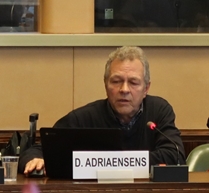 The Iraqi Commission of Integrity, responsible for investigating corruption scandals, has found that nearly half of Government revenues were stolen. This is a bad sign in terms of reconstruction efforts, as Mr. Adriaensens said. He stressed how important it is to be aware of the existing corruption in Iraq, to understand that sectarianism is not the only cause of unrest and destabilisation, and that the takeover by ISIS was a natural consequence of the sectarian heritage of the country, as analysed by experts. In fact, studies show that the main cause for the rise of ISIS is the so-called “absence of inclusive, responsive and responsible governance”; for example, when Maliki resigned from his office and was replaced, statistics showed that support for ISIS dropped drastically, since people expected changes and improvements in public services, even though these expectations were not met. Thus, this shows how proper administration and good governance would greatly reduce support for ISIS.
The Iraqi Commission of Integrity, responsible for investigating corruption scandals, has found that nearly half of Government revenues were stolen. This is a bad sign in terms of reconstruction efforts, as Mr. Adriaensens said. He stressed how important it is to be aware of the existing corruption in Iraq, to understand that sectarianism is not the only cause of unrest and destabilisation, and that the takeover by ISIS was a natural consequence of the sectarian heritage of the country, as analysed by experts. In fact, studies show that the main cause for the rise of ISIS is the so-called “absence of inclusive, responsive and responsible governance”; for example, when Maliki resigned from his office and was replaced, statistics showed that support for ISIS dropped drastically, since people expected changes and improvements in public services, even though these expectations were not met. Thus, this shows how proper administration and good governance would greatly reduce support for ISIS.
People’s trust in the central Government continues to erode, and protests against corruption, poor services and sectarianism persist. The growing success of armed groups is also due to the inability of Prime Minister Al-Abadi to control the militias, thus posing a major threat to the future of Iraq and to its reconstruction. Sectarianism could be the most important factor of instability in the near future, if standards of good governance are not met.
Nonetheless, the corruption and the fighting have to stop, and a clear program for the future of the country is vital and urgently needed. Furthermore, spending needs to be better handled; it has been shown that the amount the US Government has invested in democracy and civilian programs in 2016 is nothing compared to military spending.
Mr. Adriaensens concludes his presentation by stating that there is no miraculous solution for building stability in Iraq. Undoubtedly, good governance is essential to solve this instability and to address its causes, to try and pave the way for a peaceful and fair future in Iraq.
He also affirms that is extremely important to try and understand the complex social, economic and political factors that have led to the rise and success of ISIS, and on how the West has played a decisive and devastating role in the radicalization of Muslims. Military interventions in the Middle East have only caused more harm than good. The West has supported the Iraqi Government when they shot unarmed Sunni demonstrators, bombing Sunni territories and supporting Shia militias that committed large scale war crimes, putting all emphasis on ISIS for this important political role.
In conclusion, the denial of the Western’s own destructive war campaign, which has destroyed the region, hurt the population and caused the refugee crisis, is a contributing factor to the continuing instability in Iraq.
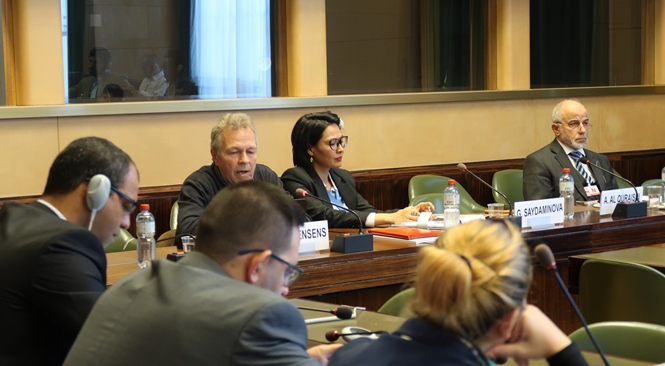
After his presentation the moderator, Ms. Saydaminova commented that all warring parties should be complying with international obligations and the Iraqi government has to ensure international obligations including that all Iraqis are allowed to return and measures of compensation must be addressed.
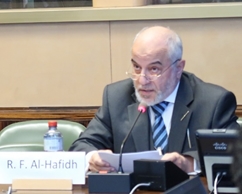 The second speaker, Mr. al-Hafidh, via a power point presentation began by accentuating the role of civic society in that it needs to be able to bring its problems and difficulties directly to an international audience when Government is out of reach or unable to establish any communication, let alone when Government is the main cause for these difficulties. Similarly, the UN needs to hear the facts directly from civic society institutions if it is going to be successful in its difficult task of restoring local and regional security and stability, leading ultimately to the global stability that we all seek.
The second speaker, Mr. al-Hafidh, via a power point presentation began by accentuating the role of civic society in that it needs to be able to bring its problems and difficulties directly to an international audience when Government is out of reach or unable to establish any communication, let alone when Government is the main cause for these difficulties. Similarly, the UN needs to hear the facts directly from civic society institutions if it is going to be successful in its difficult task of restoring local and regional security and stability, leading ultimately to the global stability that we all seek.
In light of this, he went on to introduce the dire situation the population of Mosul currently face as they cannot find peace and security with any of the institutions of the Iraqi State, and with their city lying in ruins they cannot find places of shelter.
Mr. al-Hafidh believes that there is a chronic dilemma in Iraq noting that security has been a serious issue in Mosul since 2003. The chronic dilemma is firstly because of the sectarian policies of the Iraqi security forces that humiliated the population and refused to listen to their peaceful demands, and they also enacted a policy of detentions without trial. Secondly, during the ISIS occupation (following the utter failure of the Iraqi government to defend the city), and finally, during the battle to retake the city.
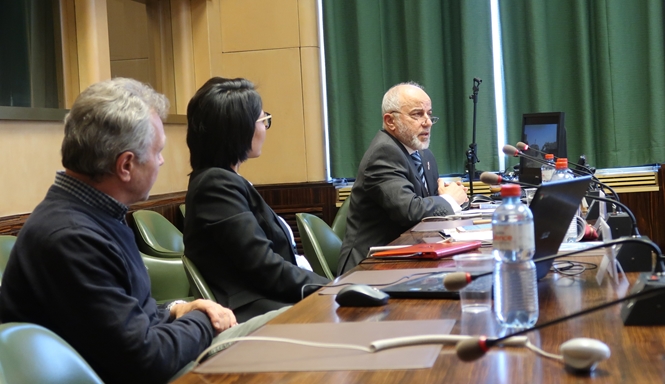
This battle, in which, the Iraqi government ignored the advice and warnings of military experts and encircled ISIS inside the old city, used excessive force and random “dump” weapons to kill more than 40 thousand innocent civilians in the city. Iraqi government forces have been implicated by the United Nations and a multitude of human rights organisations in this crime that has resulted in the destruction of the city.
He went on to mention that the catastrophic price regarding lives and the destruction of infrastructure for the battle can be appreciated when compared with the liberation of Tel Afar, from which, ISIS were allowed to withdraw and the town was peacefully re-taken sparing the city and its population.
Mr. al-Hafidh explained that the situation in Mosul is worse than going back to “square one” as the political result of this battle is that the city has fallen once more into the hands of the sectarian militias that have now been incorporated within the apparatus of the State, levying taxes and conducting acts of kidnapping, extra-judicial executions, including the confiscation/destruction of private property while wearing police and army uniforms. Furthermore, the government sponsored militias are actively changing the political map of the city to influence the results of any future elections, a behaviour not befitting a member state of the United Nations and is more reminiscent of the total chaos that follows the failure and collapse of the State, as was the case in Bosnia and Kosovo for example.
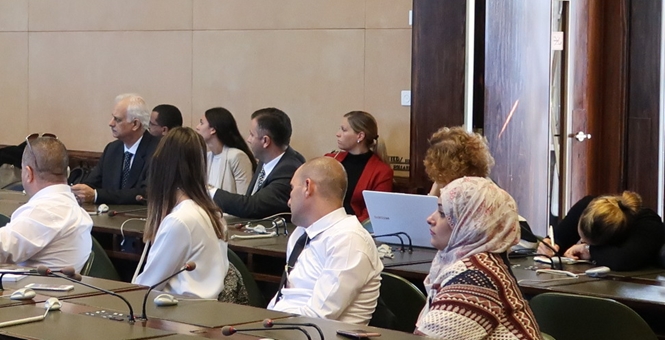
Now, the sons of Mosul must prove their innocence from the accusation that they cooperated with ISIS, which can be pressured by any militiaman, resulting in a swift death in front of their iPhone cameras.
Mr. alHafidh reaffirmed that the destruction of Mosul has been estimated at anything between 70% and 100%; and additionally, the coffers are empty and the government is corrupt. Thus, he said, the million-dollar question remains, “Who will rebuild Mosul and with what funds?”
If the current situation persists, he said, the results would be catastrophic for the city of Mosul and its population. For instance:
- Ethnic cleansing on sectarian lines to change the demographics of the population.
- Cultural destruction of religious and ethnic tolerance for which the city is renowned and which the region is in much need of.
- The removal of a major centre of civilisation in the region that has long acted as an intellectual safety valve.
- The creation of a drug economy based on the influence of powerful War Lords.
- The rise of a vice-based economy.
- Mysterious monies made available to buy land and real-estate in Mosul at tempting prices.
- Transformation of the character of city’s population from that of an ancient centre of civilisation to one of refugee camp dwellers, and the creation of a new generation of millions of uneducated, helpless young people and extremists.
- The destruction of the cultural, artistic, intellectual and artisan folk heritage of Mosul society.
- Control of the Mosques in the city for aims that do not serve the city and its people.
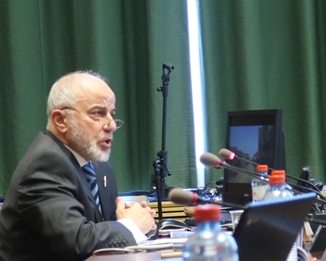 Due to a failed government and corruption these changes will not be reversible with time. Additionally, Mr. al-Faidh explained that this chronic political failure and the record levels of corruption in Iraq have transformed the institutions of the State (the constitution, Parliament, the judiciary and the security forces) into an ethnic/sectarian battleground. This has crippled the instruments of the State and made it impossible for the Government to be held accountable in the normal way.
Due to a failed government and corruption these changes will not be reversible with time. Additionally, Mr. al-Faidh explained that this chronic political failure and the record levels of corruption in Iraq have transformed the institutions of the State (the constitution, Parliament, the judiciary and the security forces) into an ethnic/sectarian battleground. This has crippled the instruments of the State and made it impossible for the Government to be held accountable in the normal way.
Moreover, the government in many aspects isn’t taking decisive and necessary decisions and actions. For instance, he said it didn't provide an ambulance or a wheel chair when it waged the battle of Mosul yet it celebrated victory on top of rubbles under which people were still alive.
The situation is made worse still by the inability or unwillingness of the Iraqi government to follow the norms that govern the relationship between a government and its population as defined by the United Nations. The situation also makes it near impossible for Mosul’s civic society to make any form of meaningful contributions toward finding a solution based on the experiences of other nations.
The destroyed city of Mosul (named Hiroshima’s twin) is facing a stark conundrum: No re-development without scrupulous, competent administration; no honest administration without security; and no security without the removal of State sponsored militias from the city leaving the cost of this conundrum at a colossal amount.
Mr. al-Hafidh considers security as the way out since it is the key to the rehabilitation of Mosul. The population of the city cannot find peace and security with any of the institutions of the Iraqi State, and the only remaining viable option left in the face of the annihilation of the city is to seek international protection for the city.
In light of these considerations, he brought to attention that Mosul society represented by its professional sons and daughters calls the United Nations to declare Mosul a “Disaster City” and provide protection for its citizens to fulfil the following vital duties:
- Provide security and international supervision on the removal of militias from the city.
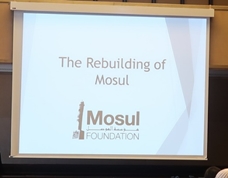
- Oversee the removal of corrupt, government appointed officials from city offices and institutions.
- Enable civic society to form a temporary, apolitical administration to run the city and prepare for future elections to determine the nature of city governess.
- Oversee the allocation of part of the national oil revenues (as an Oil for Redevelopment and Compensation Programme) to be deposited in a special fund together with any international donations.
- International supervision of the funding and execution of all re-development projects.
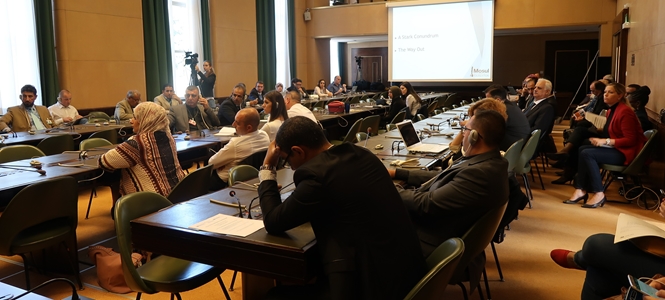
Mr. al-Hafidh concluded by noting that this catastrophic state of affairs was predicted by The Mosul Foundation before the battle. The Foundation warned of the results of this battle and put forward a realistic roadmap to deal with the situation. Today, and after what we had predicted sadly became a reality, The Mosul Foundation is advocating for this Roadmap with the support of tens of thousands of the sons and daughters of Mosul from all walks of life and from all professions and specializations. Finally, The Mosul Foundation hopes that the international community, civic society, and the UN agency will respond positively to this legitimate and just request.
The moderator, Ms. Saydaminova remarked that the UN funds are not enough and that the respect to protect is not being adhered. Moreover, there is no money from any of the involved parties that have been given even towards the rebuilding of hospitals. She said that the warring parties should bear responsibilities and donate funds to such institutions.
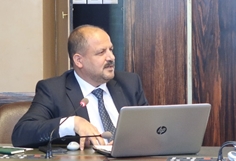
Testimony of Dr. Khadayer Al-Janabi
The final speaker was Dr. Khadayer Al-Janabi, a resident of Jurf al-Sakhar situated in the south of Baghdad and he is a university professor who also works for Masar.org, an NGO in Iraq. His presentation was a recount of the events and governmental response towards the “liberation” campaign. After the military campaign, he said that all inhabitants of the town became IDPs, in other words there were no more citizens. They all had to leave by force as a result of the government’s inability to provide security, which was exploited. In his testimony he stated:
This is a testimony presented on behalf of the sons of Jarf al-Sakhr, situated south of Baghdad, and an agricultural strategic area of 1625 square kilometers with a population of 120,000, all of whom are displaced and have not been allowed to return despite the passage of three years.
As a result of the inability of successive Iraqi governments to control security and order and the law and the result of external intervention, the organization spread within the Sunni-majority areas, taking advantage of the security vacuum and the injustice, oppression, and neglect experienced in those areas.
At the end of 2012, the organization dominated the area of Jurf al-Sakhr after the withdrawal of security forces charged with protecting the region. The intensive and continuous shelling began, which caused the displacement of half the population of the area and the destruction of 2,500 residential homes.
In October 2014, the organization withdrew from the region and the militias took control of the region causing further displacement of the entire population. Since then, the entire area has been under the control of the Hezbollah militia, which closed the area with their headquarters, arms factories, and secret prisons. So far, the displaced have not been allowed to return.
The executive authority represented by the Prime Minister and the Babil Governorate Council showed complete inability to return the displaced as a result of the continued rejection of Hezbollah. Religious references showed total disability, as did clan mediation. However, a delegation from the region went to Iran who agreed to return the displaced. Thus, Iran controls even the return or non-return of displaced persons in a very small area of Iraq. Despite a year and a half of Iranian approval, it appeared to be a trickery, with procrastination to do so.
We noted that the greater the pressure exerted on the return of the displaced, the more negative it would be to prevent return to the extent that the Babil Council issued two months ago a decision to criminalize and prosecute those who demanded the return of displaced persons in violation of the law, the Constitution, and international and humanitarian resolutions and conventions.
This testimony is only an example and shortens the suffering of displaced people in Iraq as a result of their suffering as victims due to wars and military actions. With the failure of the US administration, the inability of the Iraqi government, the growing strength of the armed militias and their control of the country, the inability of civilian pressure forces and religious references to stand up to the militias, especially the Hezbollah militia, human rights and international treaties to protect civilians during conflict will continue to be violated.
At the end of my testimony, I recall the humanitarian duty and ask the delegates and all the peace-loving countries to intervene in order to work for a dignified return of all displaced persons to their areas and to provide humanitarian assistance to alleviate their suffering.
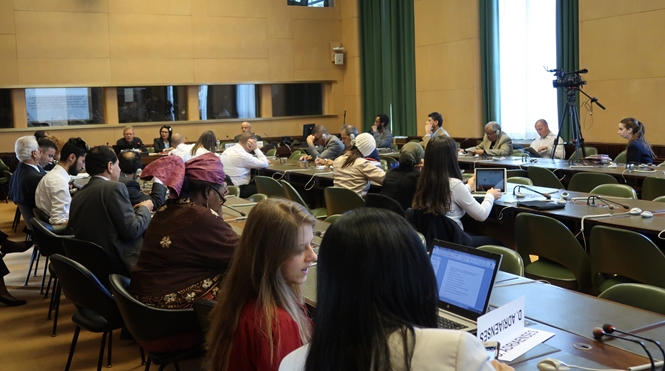
Round of Questions and Comments
Commentator 1
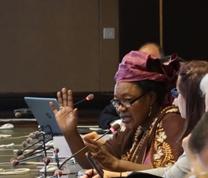 The first person to take the floor spoke in French and correlated the humanitarian situation in Mosul to that of the Central African Republic (CAR) mentioning that it was similar. She noted that during and after such a crisis women and children become the most vulnerable victims and that the impact of this war and the future of the children and the country is critical. She then asked what the suffering was like for women and children during the fighting?” and “What is the role of the Mosul Foundation and the actions posed for women and children?” She also highlighted the important role of women saying that they are the primary care-takers of children.
The first person to take the floor spoke in French and correlated the humanitarian situation in Mosul to that of the Central African Republic (CAR) mentioning that it was similar. She noted that during and after such a crisis women and children become the most vulnerable victims and that the impact of this war and the future of the children and the country is critical. She then asked what the suffering was like for women and children during the fighting?” and “What is the role of the Mosul Foundation and the actions posed for women and children?” She also highlighted the important role of women saying that they are the primary care-takers of children.
Response
Dr. Al-Hafidh first responded by remarking that the Mosul Foundation was established just before the war broke out. Secondly, he said that the solution has to come from outside. He also reflected how Mosul has provided doctors, engineers, scientific specialization among many other constructive things but it cannot provide security, which he feels has to come from the international community and governments.
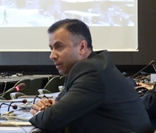 Commentator 2
Commentator 2
The second person to take the floor mentioned that before the city fell to Daesh there was a withdrawal of Iraq forces and citizens were witnessing the destruction of the whole area yet nobody from Daesh was arrested and no bodies of the militants were found. They noted that Daesh concluded an agreement with Hezbollah and similarly the Syrian regime is being protected. While the international community knows that Daesh is a fabrication the regime is destroying Iraq; Daesh, Hezbollah, and terrorist Shia militias are all the same and coming from Iran. The commentator also asked, “Why is Daesh everywhere without intervention from the international community?”
Commentator 3
 The third person from the floor noted that Iraq has resources and they don’t really need support from the UN or the international community. The UN has a role to play in terms of informing but at the beginning of the “liberation” campaign we did not hear about the destruction and we did not hear about the humanitarian disaster. They asked, if the panel can make clarifications about sectarian and ethnic implications before, during, and after the occupations and what the role is of countries like Turkey.
The third person from the floor noted that Iraq has resources and they don’t really need support from the UN or the international community. The UN has a role to play in terms of informing but at the beginning of the “liberation” campaign we did not hear about the destruction and we did not hear about the humanitarian disaster. They asked, if the panel can make clarifications about sectarian and ethnic implications before, during, and after the occupations and what the role is of countries like Turkey.
Commentator 4
 The fourth person was from Palestine and said that Palestinians are particularly sensitive to such crises because they have lived through them and can empathize and feel what is happening to the people and the country. She claimed that what is taking place in Mosul is a failure of the international community but if they really wanted they could have prevented this catastrophe. In a lot of UN sessions many calls are made without any action. She asked the panel if they had any thoughts on why Arabic populations are stagnant.
The fourth person was from Palestine and said that Palestinians are particularly sensitive to such crises because they have lived through them and can empathize and feel what is happening to the people and the country. She claimed that what is taking place in Mosul is a failure of the international community but if they really wanted they could have prevented this catastrophe. In a lot of UN sessions many calls are made without any action. She asked the panel if they had any thoughts on why Arabic populations are stagnant.
Commentator 5
 The final person to take the floor was from Yemen and said that Houthii militias had also taken over their city and that they had also faced al-Qaeda but they had humanitarian aid. The commentator disagreed with one of the speakers on the subject of security and did not believe that the international community are the only ones that can deliver security. They acknowledged that humanitarian organisations are necessary and remarked that the work must come from local communities.
The final person to take the floor was from Yemen and said that Houthii militias had also taken over their city and that they had also faced al-Qaeda but they had humanitarian aid. The commentator disagreed with one of the speakers on the subject of security and did not believe that the international community are the only ones that can deliver security. They acknowledged that humanitarian organisations are necessary and remarked that the work must come from local communities.
Response and concluding remarks
Dr. Al-Hafidh responded by saying that international communities are not taking action and this is a fact. The international community will respond when there is a common ground and common interests. He also said that Western politicians are also corrupt and politicians in general can find an answer for every case except for what is happening in the Middle East. He remarked that experts and scientists among others from the Middle East are recruited by the West yet their media portrays Middle Easterners as mad and uncivilized. Acknowledging that local people can fix their societies he added that politicians are not interested in this avenue. As well, what is common with civic society is that they have an interest to dialogue with the West and people are having less interest in the political establishment and moving more towards NGOs. Therefore, he concluded, civic society has to take advantage of such platforms.
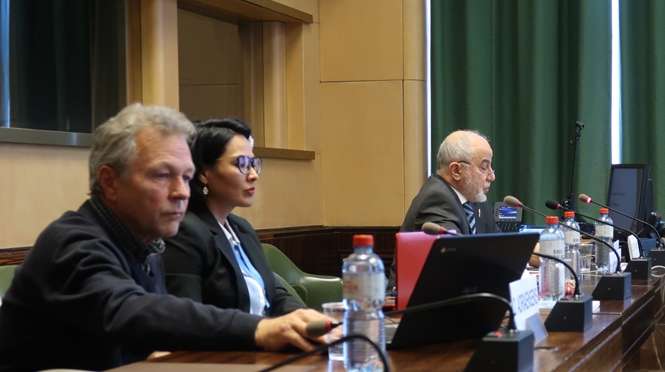
The panel acknowledged that regional powers around Iraq have influences in Iraq and that the media takes more interest in political spheres. Dr. al-Jannabi concluded by saying that the common responsibility of civic society is to overcome any type of phenomenon, acknowledged that women and children are first victims, and when that the education sector has the highest numbers of IDPs. Finally, he recalled that in the past the region of Iraq ranked at the top globally in literacy but has now regressed to only 40 percent of the population and that children now go to school for only three hours out of three days of the week.
Watch the full side-event online in English or Arabic.
Reports of the Side-event:
|
قراءة على الانترنت أو تحميل التقرير الكامل. |
|
Lire en ligne ou télécharger le rapport complet. |
Leer en línea o Descargar el Reporte Completo. |
Photo gallery:




